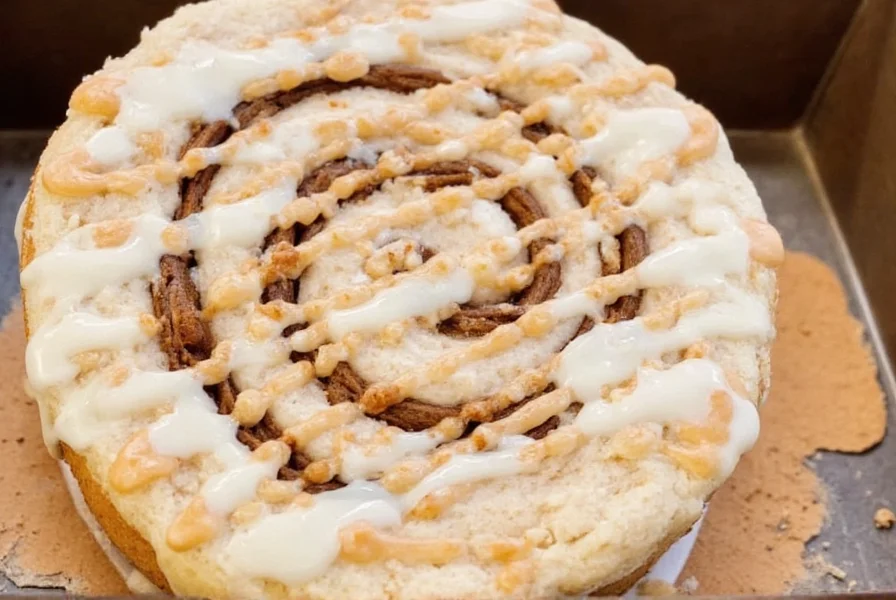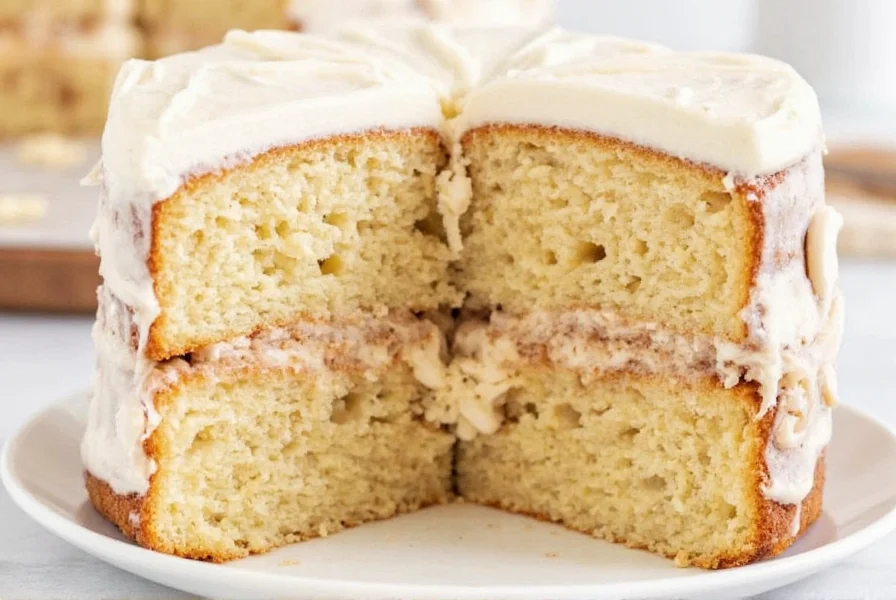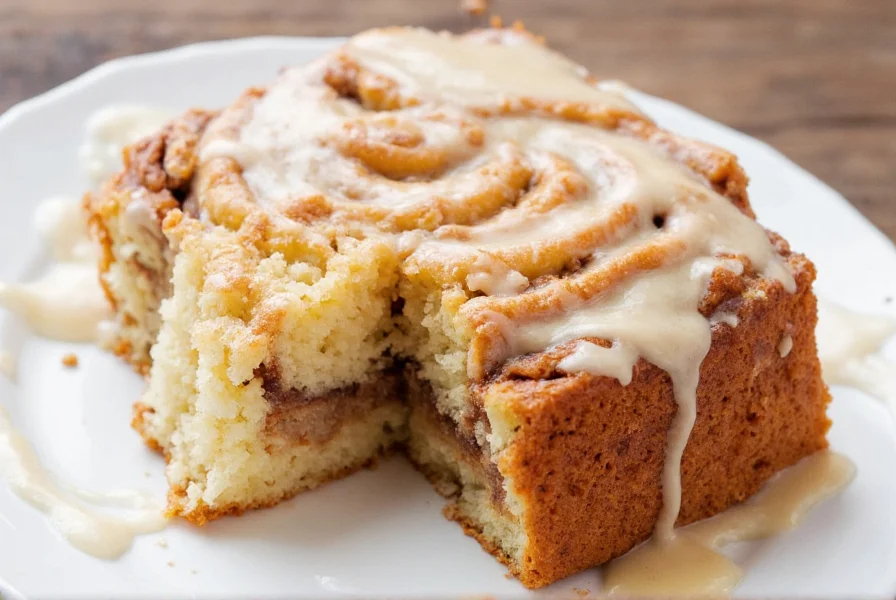The Smart Shortcut: Why Cake Mix Works for Cinnamon Roll Cake
Creating a cinnamon roll cake with cake mix isn't just convenient—it's scientifically sound. Boxed cake mixes contain precise ratios of leavening agents, starches, and emulsifiers that ensure consistent rise and texture. When adapted for cinnamon roll cake, the mix's neutral base absorbs flavors exceptionally well while maintaining structural integrity during the swirling process.
Professional bakers often use this method because cake mixes eliminate common pitfalls of yeast-based doughs, such as inconsistent rising or gluten development issues. The result? A reliably tender crumb with that signature cinnamon swirl pattern every time—without the 3-hour wait required for traditional cinnamon rolls.
Essential Ingredients Breakdown
Understanding each component's role ensures success with your cinnamon roll cake. Unlike scratch recipes, cake mix versions require fewer ingredients but precise measurements:
| Ingredient | Function | Critical Notes |
|---|---|---|
| Yellow cake mix (18.25oz) | Base structure and sweetness | Do not use 'extra moist' varieties—they create dense texture |
| Unsweetened applesauce (⅓ cup) | Moisture replacement | Substitutes oil for cleaner flavor without compromising texture |
| Ground cinnamon (2 tbsp) | Primary flavor agent | Freshly opened container ensures maximum potency |
| Brown sugar (¾ cup) | Caramelization and moisture | Pack firmly for accurate measurement |
Step-by-Step Preparation Guide
Follow these precise steps for optimal results. The key difference from standard cake preparation is the swirling technique—which requires specific timing to prevent ingredient separation.
- Preheat and prepare: Set oven to 350°F (175°C). Grease a 9x13 inch pan and line with parchment paper, leaving 2-inch overhangs on two sides for easy removal.
- Mix batter: Combine cake mix, applesauce, eggs, and water in bowl. Beat 2 minutes on medium speed until smooth. The batter should have thick, ribbon-like consistency when lifted.
- Create cinnamon layer: Mix brown sugar and cinnamon in separate bowl. Melt butter and cool to room temperature—warm butter will melt the sugar mixture.
- Swirl technique: Spread half the batter in pan. Drizzle ⅔ of melted butter over batter, then sprinkle half the cinnamon mixture. Repeat layers, finishing with remaining batter. Use a knife to create figure-8 patterns through all layers—this creates the signature swirl without overmixing.
- Bake precisely: 28-32 minutes until toothpick inserted 1 inch from center comes out clean. Overbaking causes cracking in the swirl pattern.
Avoiding Common Pitfalls
Even experienced bakers encounter issues with cinnamon roll cakes. These science-backed solutions prevent frequent problems:
- Swirl disappearance: Caused by overmixing during swirling. Use minimal knife strokes (5-7 max) and maintain cold ingredients—warm batter blends layers together.
- Sunken center: Typically from opening oven during first 20 minutes. The cake's structure hasn't set, causing collapse. Use oven light to check progress.
- Dry texture: Using oil instead of applesauce or overbaking by even 3 minutes. Set timer for 28 minutes and check early.
- Sticking to pan: Always use parchment paper with overhangs. Cool 10 minutes before lifting from pan using paper handles.
Professional Variations Worth Trying
Once you've mastered the basic technique, these chef-tested modifications elevate your cinnamon roll cake:

- Nutty crunch: Add ½ cup chopped pecans to cinnamon layer for texture contrast that complements the soft crumb.
- Apple cinnamon: Fold 1 cup finely diced apples (tossed in 1 tsp lemon juice) into batter before swirling.
- Gluten-free version: Use certified gluten-free cake mix and add 1 tsp xanthan gum to prevent crumbliness.
- Reduced sugar: Substitute half the brown sugar with date paste (¼ cup dates blended with 2 tbsp hot water).
Frosting Application Science
The timing of frosting application dramatically affects texture. For optimal results:
- Prepare cream cheese frosting while cake bakes
- Cool cake 15 minutes—any less and frosting melts into batter; any more and it won't absorb properly
- Use offset spatula to spread frosting in circular motions from center outward
- For clean slices, chill frosted cake 30 minutes before cutting with hot knife
Storage and Serving Best Practices
Unlike traditional cinnamon rolls, cake versions maintain quality longer due to cake mix's preservatives. Follow these storage guidelines:
| Storage Method | Duration | Reheating Tip |
|---|---|---|
| Room temperature (airtight) | 3 days | 10-second microwave burst restores freshness |
| Refrigerated (wrapped) | 7 days | Warm 20 seconds at 50% power with damp paper towel |
| Frozen (sliced) | 2 months | Thaw 10 minutes at room temperature before reheating |

Troubleshooting Your Cinnamon Roll Cake
When issues arise, these targeted solutions fix common problems:
- Problem: Swirl pattern isn't visible
Solution: Next time, chill batter 10 minutes before swirling—cold batter maintains distinct layers better. - Problem: Cracks on surface
Solution: Reduce oven temperature by 25°F and extend baking time by 5 minutes for more even rise. - Problem: Soggy bottom layer
Solution: Place baking pan on preheated cookie sheet to ensure even bottom heat distribution.
Frequently Asked Questions
Can I use any cake mix flavor for cinnamon roll cake?
Yellow or vanilla cake mix works best for cinnamon roll cake with cake mix. Chocolate or spice cake varieties alter the traditional flavor profile. Avoid lemon or citrus-flavored mixes as their acidity interferes with the cinnamon-sugar layer adhesion.
Why does my cinnamon roll cake sink in the middle?
Sinking typically occurs from opening the oven door during the first 20 minutes of baking or overmixing the batter. The cake's structure hasn't set, causing collapse when exposed to temperature changes. Always wait until the minimum baking time has elapsed before checking.
How do I prevent the cinnamon layer from sinking to the bottom?
Chill your cinnamon-sugar mixture for 10 minutes before layering. Cold ingredients maintain separation better during baking. Also, ensure melted butter has cooled to room temperature—warm butter dissolves the sugar layer, causing it to sink.
Can I make this recipe ahead of time?
Yes, prepare the batter and layered pan up to 24 hours ahead. Cover tightly and refrigerate. When ready to bake, remove from fridge 30 minutes before baking to take the chill off—this ensures even rising. Do not swirl until ready to bake.
What's the best way to slice cinnamon roll cake neatly?
Chill the frosted cake for 30 minutes, then use a hot knife (dipped in boiling water and dried) for clean slices. Wipe the knife between cuts. For perfect swirl presentation, cut from the center outward in a circular motion rather than straight lines.











 浙公网安备
33010002000092号
浙公网安备
33010002000092号 浙B2-20120091-4
浙B2-20120091-4